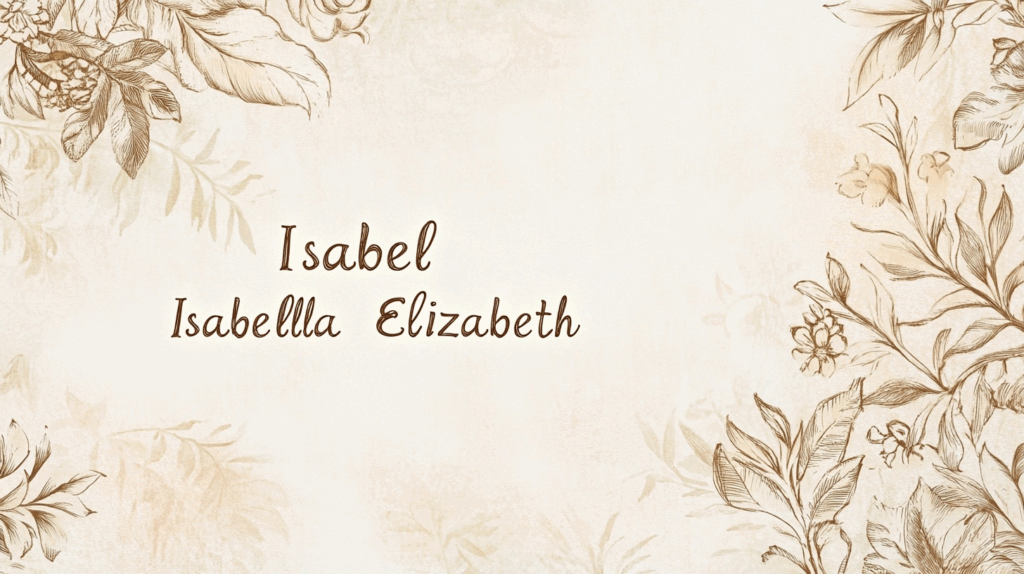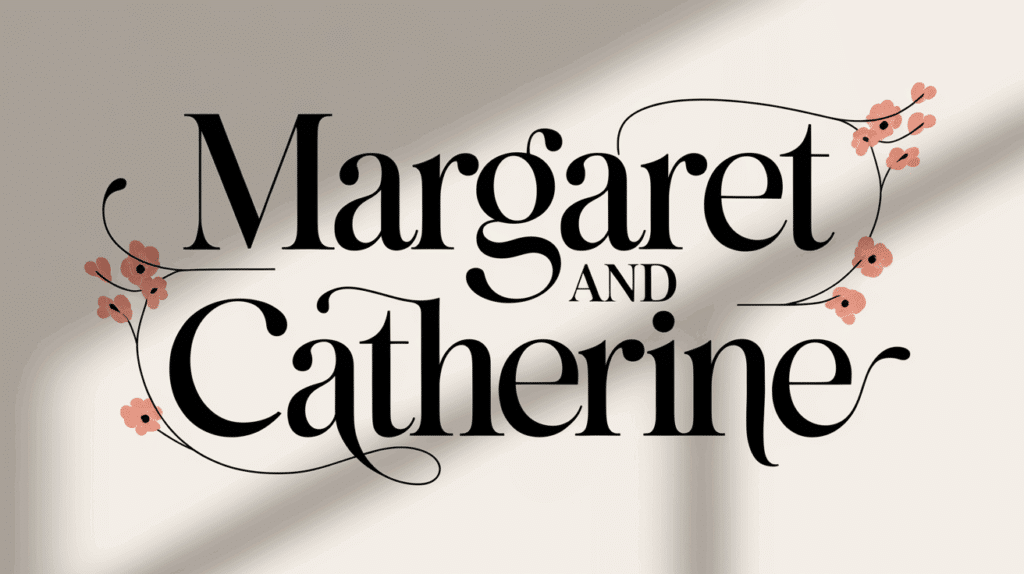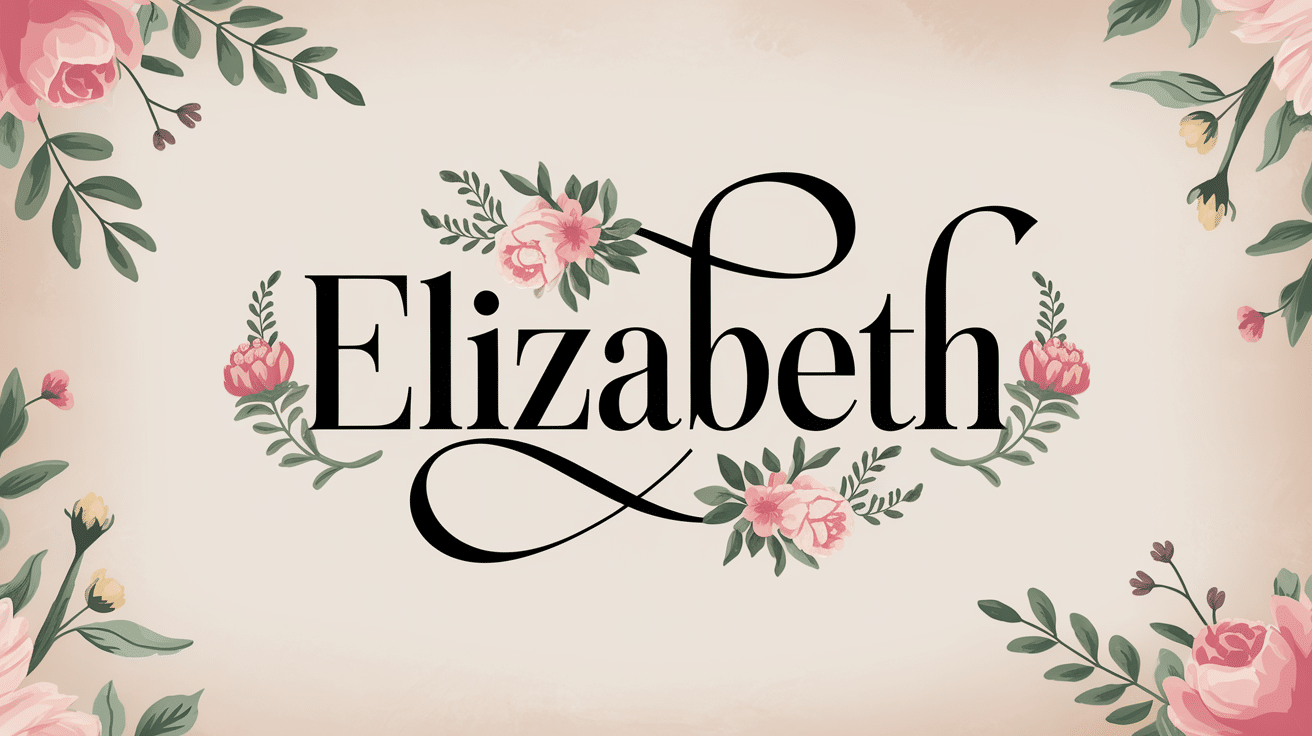Elizabeth is one of those names that’s been around forever. You’ve probably heard it in stories, seen it in movies, or even know someone with the name. It’s been used for hundreds of years, and people still love it today.
It was used by queens. It shows up in the Bible. Many people still choose it because it sounds strong, kind, and classic.
But let’s say you want something a little different. Perhaps you like how Elizabeth feels, but you want a name that’s not as commonly used. Or maybe you just want something close to it—something that feels just as nice, but stands out a little more.
This guide will show you:
Names like Elizabeth from other countries
Cute nicknames for Elizabeth
Names that mean something close to Elizabeth
Modern choices that still have that same strong and classic feel
Let’s start finding a name that feels right for you or your little one!
Classic Variations of Elizabeth
Elizabeth has inspired numerous variations throughout history, each with its own charm and character, while maintaining the timeless appeal of the original.
These classic derivatives range from short, sweet nicknames to formal variations found across different cultures and languages.
Each name carries a connection to Elizabeth’s rich heritage while offering families a way to honor the tradition with a slightly different sound or style.
1. Eliza
- Meaning: A shortened form of Elizabeth meaning “pledged to God” or “God is my oath.”
- Origin: Hebrew, through Greek and Latin
- Cultural significance: Gained popularity in the 18th and 19th centuries; notably the character Eliza Doolittle in “Pygmalion” and “My Fair Lady.”
2. Elsa
- Meaning: A variation of Elizabeth with the same meaning of “pledged to God.”
- Origin: Germanic/Scandinavian short form of Elisabeth
- Cultural significance: Common in Nordic countries; gained renewed interest after Disney’s “Frozen” featured a main character with this name.
3. Elspeth
- Meaning: Scottish form of Elizabeth, sharing the meaning “God is my oath.”
- Origin: Scottish variation of Elizabeth
- Cultural significance: Has a distinctive Scottish heritage and maintains a traditional, noble quality.
4. Lilibet
- Meaning: A personal diminutive of Elizabeth
- Origin: Famously used as Queen Elizabeth II’s childhood nickname
- Cultural significance: Known primarily through the British royal family; gained renewed attention when Prince Harry and Meghan Markle named their daughter Lilibet.
5. Bethany
- Meaning: While not directly derived from Elizabeth, it shares the Hebrew “beth” element; means “house of figs” or “house of poverty.”
- Origin: Hebrew biblical place name
- Cultural significance: Has both biblical connections and modern appeal; appears in the New Testament as a village near Jerusalem.
6. Bettina
- Meaning: A diminutive form of Elizabeth, sharing the meaning “my God is an oath.”
- Origin: Italian/German pet form of Elizabeth
- Cultural significance: More common in European countries, particularly Italy and Germany.
7. Betty
- Meaning: A familiar shortened form of Elizabeth.
- Origin: English diminutive of Elizabeth
- Cultural significance: Very popular in the 1920s-1950s; associated with figures like Betty White and Betty Ford.
8. Ellie
- Meaning: A nickname form of names beginning with “El” including Elizabeth.
- Origin: English diminutive
- Cultural significance: Has seen a strong resurgence in popularity in recent decades as parents seek friendly, approachable names.
9. Ella
- Meaning: While sometimes used as a nickname for Elizabeth, it also stands alone, meaning “fairy maiden” or “all” in some origins.
- Origin: English, German, Spanish, and Hebrew roots
- Cultural significance: Has a musical quality; associated with jazz singer Ella Fitzgerald; currently enjoying widespread use.
International Variations of Elizabeth

These international variations showcase how this timeless name has traveled across borders and been embraced by diverse linguistic traditions.
Each adaptation maintains the essence of Elizabeth while incorporating phonetic elements specific to its language of origin, demonstrating the name’s remarkable versatility and enduring appeal worldwide.
10. Isabella (Italian)
- Meaning: The Italian variation of Elizabeth, sharing the root meaning “pledged to God.”
- Origin: Italian adaptation of the Hebrew name, influenced by Latin forms
- Cultural significance: A regal name in Italian history; associated with Queen Isabella of Castile; gained significant popularity in English-speaking countries in the early 2000s.
11. Isabel (Spanish)
- Meaning: Spanish form of Elizabeth meaning “God is my oath.”
- Origin: Spanish adaptation of the Hebrew name
- Cultural significance: Common in Spanish-speaking countries; carried by many queens and nobility throughout Spanish history.
12. Élisabeth (French)
- Meaning: French variant of Elizabeth with the same meaning “God is my oath.”
- Origin: French adaptation of the Hebrew name
- Cultural significance: The traditional French spelling; used by French royalty including Élisabeth of France, sister of Louis XVI.
13. Elisabeta (Romanian)
- Meaning: Romanian version of Elizabeth sharing the meaning “God is my oath.”
- Origin: Romanian adaptation of the Hebrew name
- Cultural significance: Common in Romania and among Romanian communities; reflects the Latin influences in Romanian language.
14. Elisabete (Portuguese)
- Meaning: The Portuguese variant meaning “my God is an oath.”
- Origin: Portuguese adaptation of the Hebrew name
- Cultural significance: Popular in Portugal and Brazil; adapts the name with Portuguese phonetic patterns.
15. Isobel (Scottish)
- Meaning: Scottish variant of Elizabeth sharing the meaning “God is my oath.”
- Origin: Medieval Scottish form of the name
- Cultural significance: Has a distinctive Scottish heritage; appears in Scottish literature and history; often associated with Highland traditions.
16. Elzbieta (Polish)
- Meaning: Polish version of Elizabeth meaning “God is my oath.”
- Origin: Polish adaptation of the Hebrew name
- Cultural significance: Common in Poland; pronounced with emphasis on the second syllable; has been borne by notable Polish women including Nobel Prize-winning poet Wisława Szymborska’s given name.
Nicknames and Shortened Forms of Elizabeth
Common and creative nicknames and shortened forms for Elizabeth. These diminutives offer more casual, friendly alternatives to the formal Elizabeth.
Throughout history, these shortened forms have developed naturally as terms of endearment or convenience, with different variations becoming popular during different eras.
Each nickname carries its own personality and character while maintaining a connection to the original name.
17. Beth
- Meaning: A simple truncation of Elizabeth, retaining the latter portion of the name.
- Origin: English informal shortening of Elizabeth.
- Cultural significance: Often seen as more mature and grounded compared to other nicknames; featured in literature such as “Little Women” with the character Beth March.
18. Liz
- Meaning: A straightforward shortened form of Elizabeth.
- Origin: English nickname derived from the middle syllable of Elizabeth.
- Cultural significance: A practical, no-nonsense nickname; associated with figures like actress Liz Taylor; has a modern, efficient quality.
19. Liza
- Meaning: A nickname derived from the pronunciation of Elizabeth.
- Origin: English variation, though similar to the standalone name Eliza.
- Cultural significance: Has a bright, energetic quality; associated with performer Liza Minnelli; bridges the gap between Elizabeth and Eliza.
20. Betsy
- Meaning: A traditional nickname for Elizabeth with a friendly, approachable quality.
- Origin: English diminutive derived from the “bet” sound in Elizabeth.
- Cultural significance: Has a vintage, Americana feel; associated with early American history through Betsy Ross; evokes a warm, wholesome character.
21. Libby
- Meaning: A playful derivative of Elizabeth.
- Origin: English nickname derived from the initial sound of Elizabeth with a diminutive ending.
- Cultural significance: Gained popularity in the mid-20th century; has a friendly, unpretentious quality; less common than some other Elizabeth nicknames.
22. Lizzy
- Meaning: An affectionate diminutive of Elizabeth or Liz.
- Origin: English nickname with the familiar “-y” ending that creates a diminutive.
- Cultural significance: Has a youthful, spirited quality; appeared in literary works including Jane Austen’s “Pride and Prejudice” with Elizabeth “Lizzy” Bennet.
23. Ellie
- Meaning: A nickname derived from the first syllable of Elizabeth.
- Origin: English diminutive of Elizabeth and other El- names.
- Cultural significance: Has seen a resurgence in recent decades; works well across age groups; has a gentle, friendly sound that appeals to modern parents.
Names with a Similar Meaning to Elizabeth
Names that carry a similar meaning to Elizabeth, such as “God is my oath.” These names share thematic connections with Elizabeth through their meanings, often containing religious undertones or references to divine concepts.
While they may sound entirely different from Elizabeth, they offer alternatives that maintain similar spiritual or conceptual significance for parents drawn to the meaning behind Elizabeth rather than just its sound or history.
24. Isabella (“God is my oath”)
- Meaning: Shares the same core meaning as Elizabeth – “God is my oath” or “pledged to God.”
- Origin: Italian and Spanish variation of Hebrew Elisheba.
- Cultural significance: Has been a royal name across Europe; saw a dramatic rise in popularity in the early 2000s; carries a grace, timeless quality.
25. Anais (“Grace”)
- Meaning: Though not identical to Elizabeth’s meaning, “grace” carries spiritual connotations.
- Origin: Catalan and Provençal form of Anna, with Hebrew roots.
- Cultural significance: Has a delicate, poetic quality; associated with writer Anaïs Nin; offers a distinctive alternative with French and Spanish connections.
26. Evangeline (“Good news, bearer of good news”)
- Meaning: Refers to bringing good news, particularly in a religious context.
- Origin: Greek elements meaning “good” and “messenger.”
- Cultural significance: Featured in Longfellow’s epic poem “Evangeline”; has a romantic, literary quality; contains religious undertones similar to Elizabeth.
27. Theodora (“Gift of God”)
- Meaning: Refers to a divine gift, connecting to the religious element in Elizabeth.
- Origin: Greek, feminine form of Theodore.
- Cultural significance: Has historical significance through Byzantine Empress Theodora; carries a regal, strong quality; shares the religious reference point with Elizabeth.
28. Victoria (“Victory”)
- Meaning: While different from Elizabeth’s meaning, it carries positive, powerful associations.
- Origin: Latin, feminine form of Victor.
- Cultural significance: Associated with Roman mythology and Queen Victoria of England; projects strength and triumph; has maintained steady popularity for centuries.
29. Grace (“Grace”)
- Meaning: Refers to divine grace or favor, connecting to the religious aspect of Elizabeth.
- Origin: Latin “gratia” meaning goodwill or favor.
- Cultural significance: Both a virtue name and a traditional name; has a simple elegance; popular as both a first and middle name; carries religious significance.
30. Amelia (“Work” or “industrious”)
- Meaning: Though different from Elizabeth, suggests positive character traits.
- Origin: Germanic roots meaning “work” or possibly Latin “aemulus” meaning “rival.”
- Cultural significance: Has royal connections; experienced a significant resurgence in popularity in the 21st century; has a gentle, classic sound with modern appeal.
Classic and Graceful Names Like Elizabeth

Other graceful, timeless names that have a similar stature and vibe to Elizabeth. These names share Elizabeth’s enduring appeal and classic nature, having remained in use for centuries while never feeling dated or tied to a specific era.
Like Elizabeth, these names carry a certain dignity and refinement that makes them suitable for both childhood and adulthood, offering versatility across all stages of life and professional contexts.
31. Charlotte
- Meaning: “Free man” or “petite”
- Origin: French feminine form of Charles, with Germanic roots
- Cultural significance: A royal name in multiple countries; combines classic appeal with contemporary popularity; associated with figures like novelist Charlotte Brontë.
32. Margaret
- Meaning: “Pearl”
- Origin: Greek “margarites” meaning pearl
- Cultural significance: Used by saints, queens, and political figures throughout history; offers many nickname options; maintains an air of dignity and strength.
33. Catherine
- Meaning: “Pure”
- Origin: Greek “katharos” meaning pure
- Cultural significance: Borne by several queens and saints; exists in many variations across cultures; projects both intelligence and warmth.
34. Victoria
- Meaning: “Victory”
- Origin: Latin, feminine form of Victor
- Cultural significance: Strong associations with Queen Victoria’s long reign; suggests triumph and dignity; maintains steady popularity without feeling trendy.
35. Eleanor
- Meaning: Disputed, possibly “bright, shining one” or “God is my light.”
- Origin: Provençal version of the Greek name Helen
- Cultural significance: Used by nobility throughout European history; experienced a revival in recent decades; combines strength with femininity.
36. Sophia
- Meaning: “Wisdom”
- Origin: Greek word for wisdom
- Cultural significance: Used across many cultures and time periods; philosophical connections; balances classical roots with contemporary appeal.
37. Julia
- Meaning: “Youthful” or “Jove’s child”
- Origin: Latin, feminine form of Julius
- Cultural significance: Ancient Roman name with continuous usage; simple yet stylish; maintains a timeless quality without feeling stuffy.
38. Adelaide
- Meaning: “Noble kind” or “nobility”
- Origin: Germanic elements meaning “noble” and “kind”
- Cultural significance: Has royal connections; experienced a revival after falling out of favor; combines vintage charm with dignified bearing.
39. Genevieve
- Meaning: “Woman of the race” or “tribe woman”
- Origin: Germanic elements, though associated with French culture
- Cultural significance: Connected to the patron saint of Paris; offers French sophistication; combines classic roots with a melodious sound.
Modern Alternatives to Elizabeth
More contemporary names that still carry the same grace and timeless appeal.
These names have gained popularity in recent decades while maintaining the sophisticated quality that makes Elizabeth so enduring.
Though newer to the mainstream, these alternatives strike a balance between fresh appeal and classic sensibility, making them suitable choices for parents seeking Elizabeth’s timeless quality in a more current package.
40. Ava
- Meaning: Possibly “life,” “bird,” or a short form of names like Aveline.
- Origin: Latin, Germanic, or Persian depending on interpretation
- Cultural significance: Short and sweet with Hollywood connections; experienced a dramatic rise in popularity in the early 2000s; combines simplicity with grace.
41. Olivia
- Meaning: “Olive tree,” a symbol of peace and fertility.
- Origin: Latin, feminine form of Oliver
- Cultural significance: Shakespearean connection through “Twelfth Night”; consistently ranks among top names in English-speaking countries; balances formality with approachability.
42. Amelia
- Meaning: “Work” or “industrious”
- Origin: Germanic roots meaning “work”
- Cultural significance: Has royal connections and aviation history through Amelia Earhart; offers vintage charm with modern usability; provides several nickname options.
43. Isla
- Meaning: “Island”
- Origin: Scottish geographical name or Spanish word for island
- Cultural significance: Nature connection; gained popularity in the 21st century; offers a short, fresh alternative with traditional roots.
44. Sophie
- Meaning: “Wisdom”
- Origin: French form of Sophia, from Greek
- Cultural significance: More casual than Sophia but maintains the same meaning; popular across many cultures; balances friendliness with intelligence.
45. Emma
- Meaning: “Universal” or “whole”
- Origin: Germanic root word
- Cultural significance: Jane Austen heroine; consistently popular across generations; simple yet complete, avoiding trends while remaining current.
46. Madeline
- Meaning: “High tower” or “woman from Magdala”
- Origin: French form of Magdalene
- Cultural significance: Children’s book character in the French series; combines French elegance with approachability; versatile with nickname options.
47. Zoe
- Meaning: “Life”
- Origin: Greek
- Cultural significance: Ancient name with modern feel; contains distinctive “z” sound while remaining classic; projects energy and vibrancy while maintaining sophistication.
Pairing Middle Names with Elizabeth-Inspired Names
Suggestions for middle names that pair beautifully with Elizabeth-inspired names. Finding the perfect middle name can improve the rhythm and flow of a first name, adding depth and personal meaning to the full name.
These combinations showcase how Elizabeth-inspired first names can be complemented by middle names of various lengths and sounds, creating harmonious pairings that work well together while maintaining the elegance associated with the Elizabeth name family.
48. Eliza Grace
- Meaning: Combines “pledged to God” with “divine favor.”
- Origin: Hebrew/Greek first name with Latin middle name
- Cultural significance: The single-syllable middle name balances the three-syllable first name; Grace adds a virtue element that complements Eliza’s traditional roots.
49. Isabella Rose
- Meaning: Pairs “God is my oath” with a classic flower name.
- Origin: Italian variation of Elizabeth with English flower name
- Cultural significance: The floral middle name softens the formality of Isabella; creates a name with both strength and beauty; flows naturally with balanced syllables.
50. Elsa Marie
- Meaning: Combines “pledged to God” with “star of the sea.”
- Origin: Scandinavian first name with French variant of Latin “Maria”
- Cultural significance: The classic Marie acts as a perfect bridge between the more contemporary Elsa and traditional naming practices; creates a name that works across generations.
51. Evangeline Claire
- Meaning: Pairs “bearer of good news” with “bright, clear.”
- Origin: Greek first name with French form of Latin “clara”
- Cultural significance: The shorter middle name balances the longer, flowing Evangeline; Claire adds simplicity to an elaborate first name; combines spiritual meaning with light imagery.
52. Victoria Anne
- Meaning: Combines “victory” with “grace.”
- Origin: Latin first name with Hebrew-origin middle name
- Cultural significance: The classic Anne complements the regal Victoria; creates a name with historical depth; follows the pattern of many royal names with a short, traditional middle name.
Conclusion
Over the years, the name Elizabeth has inspired a lot of other names. Some are short and sweet like Eliza, Liz, or Betty. Others are from different languages, like Isabella (Spanish/Italian), Elsa (German/Scandinavian), or Elzbieta (Polish).
All of these names keep part of Elizabeth’s charm but give it a fresh twist.
If you like names that feel strong, like Victoria, short and simple like Isla, or classic like Eleanor, there are lots of good choices. You have to think about what you like most about the name Elizabeth.
Is it how it sounds? Is it the meaning behind it? Maybe it runs in your family. These things can help you pick a name that feels just right.
Think about:
- Do you want a name that’s easy to shorten?
- Do you care about how it sounds with your last name?
- Is it essential that it aligns with your culture or background?
Take your time with it. Choosing a name is a significant decision, but it should also be enjoyable.




